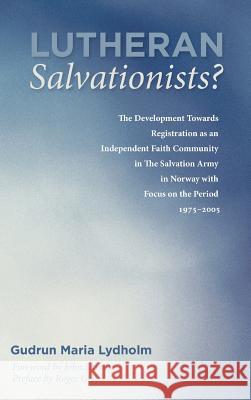Lutheran Salvationists? » książka
Lutheran Salvationists?
ISBN-13: 9781498297899 / Angielski / Twarda / 2017 / 280 str.
Lutheran Salvationists?
ISBN-13: 9781498297899 / Angielski / Twarda / 2017 / 280 str.
(netto: 208,05 VAT: 5%)
Najniższa cena z 30 dni: 216,06
ok. 16-18 dni roboczych.
Darmowa dostawa!
The idea of a state religion is seldom connected to religious freedom and liberal, modern, and democratic states. However, such a situation existed in Norway until 2012, when the Lutheran Church was the state church of Norway. A large majority of the population belonged to the church, even though the percentage in 2013 had fallen to well over seventy-five. The relationship between the church and minority religious movements demanded adaptation and compromises from the minority churches. The Salvation Armys enculturation and accommodation during its 128-year history in Norway illustrates such a situation. The book examines how The Salvation Army accommodated itself both doctrinally as well as practically to the situation of a dominant state church. The study reveals such a close affiliation of Salvationists to the Norwegian Church as a state institution, that it raises the question of whether a concept of civil religion was implicitly present in Salvationists view of the state church and their own adherence to the church. This situation also raises the question of what constitutes a real church. The book indicates the tension between Lutheran and Salvationist ecclesiology as well as the influence from the Lutheran Church.""This is an illuminating investigation into the history of cultural adaptation by The Salvation Army within Norwegian society. Such accommodation, partly due to a view of the state church as an expression of civil religion, justified dual membership of Lutheran Salvationists. Gudrun Lydholm discloses how an increasing church/state distinction within Norwegian society led to inherent tensions, as the Army sought to develop an ecclesial identity independent of the Church of Norway during the period 1975-2005.""--R. David Rightmire, PhD, Professor of Biblical and Theological Studies, Asbury University""Working in a culturally homogeneous nation with a national church puts a social revival movement like Salvation Army under pressure. At one hand, it must enculturate itself in the national culture. At the other hand, it cannot end up as just another part of that culture. Using the recent development in Norway as a test case, Lydholm tells the fascinating story of how salvationists cope with this challenge in Nordic Countries.""--Hans Raun Iversen, Director of Church Research, University of Copenhagen Gudrun Maria Lydholm (DTh, Oslo University) is a Salvation Army officer, having served in ministry in local corps (congregations) in Denmark and England, as an editor of the Danish Salvation Army publications and in leadership positions in Russia/CIS, Finland/Estonia and Norway, Iceland, and the Faroes for more than forty-three years. She now lives in active retirement in Copenhagen, Denmark.











